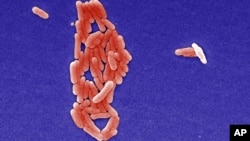Millions of people are sickened each year by the food-borne bacteria, Salmonella. But a genetically-engineered version of the pathogen may someday be used as a weapon against cancer.
Salmonella is the most common bacteria to contaminate food. Found in undercooked meats, eggs and milk, the microbe can cause severe nausea, vomiting, diarrhea, abdominal cramps and fever. One strain of Salmonella is also responsible for typhoid.
But researchers in the U.S. and Germany have turned Salmonella into a weapon against cancerous tumors.
“Yeah, it causes them to disappear," said Roy Curtiss, a microbiologist at the Biodesign Institute at Arizona State University in Tempe.
In experiments with mice, Curtiss and colleagues targeted solid tumors grown by human cancer cells, injected into the rodents.
He says they used Salmonella bacteria, that had been programmed in the laboratory, to destroy those cells.
“We genetically modify the Salmonella so it is unable to survive in healthy tissues, but has a preferential homing to tumors, which [are] a very nutrient-rich environment where they grow like crazy and, in so doing, kill the cancer cells within the tumor," he said.
An article describing the work is published in the journal mBio.
Curtiss is fascinated with Samonella, which he thinks gets a bad rap.
“I’m always looking for new uses for a bug that most people think is an enemy - it’s my friend. And I’d like to make it your friend too," he said.
Curtiss’ work has led him to create a vaccine against tuberculosis that he says is more effective against TB than the current BCG vaccine used in many countries to prevent the lung ailment.
Researchers have also developed a poultry vaccine that prevents campylobacter in chickens so they are not infected and spread the illness to humans who eat undercooked meat by accident.
But Curtiss says it will be a while before the genetically-modified version of Salmonella enters human clinical trials. He wants to tweak the bacteria further to increase their potency against cancer.
Salmonella would not be a stand-alone anti-cancer therapy. Instead, Curtiss envisions the modified bacteria being used alongside more traditional treatments, including chemotherapy and radiation, to fight cancer.




